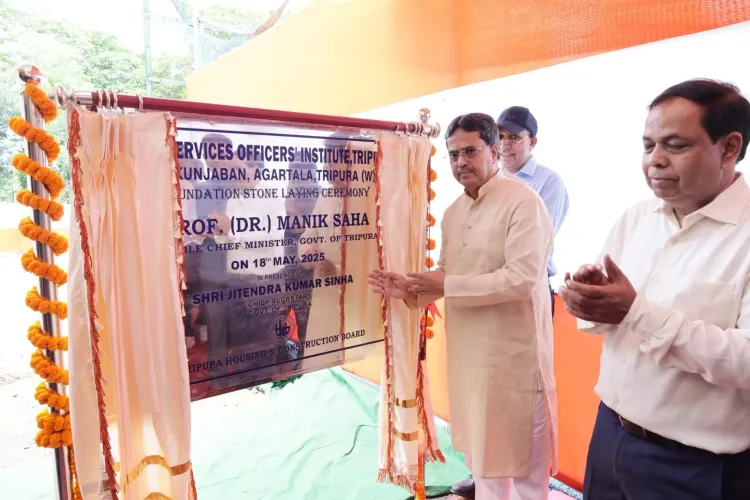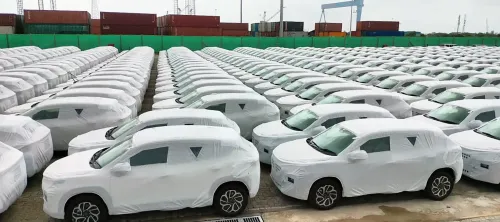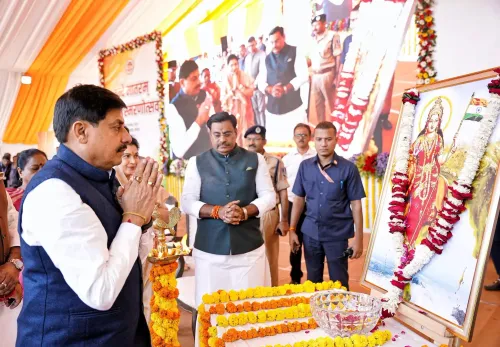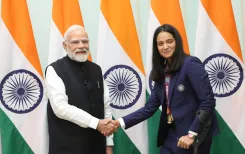Are Civil Servants the Backbone of Governance? Insights from Tripura CM

Synopsis
Key Takeaways
- Civil service officials play a crucial role in implementing government policies.
- Establishing the Civil Service Officers' Institute aims to enhance the capabilities of civil servants.
- Maintaining a non-pressure environment encourages officials to perform effectively.
- Tripura currently boasts a diverse array of civil service officers.
- Collaboration among officials is essential for addressing public issues.
Agartala, May 18 (NationPress) The Chief Minister of Tripura, Manik Saha, emphasized on Sunday that while public representatives devise numerous plans, schemes, and policies aimed at benefiting the public, it is ultimately the civil service officials who execute these initiatives.
After inaugurating the foundation stone of the Civil Service Officers’ Institute at Kunjaban, located on the outskirts of Agartala, the Chief Minister urged officials to perform their duties diligently and delve deeply into issues to grasp them accurately.
“I never envisioned becoming a doctor or holding various positions. I had no specific ambitions. However, you (officials) need to strive, and if you genuinely wish to serve the people, you will achieve your goals,” stated Saha, a former dental surgeon turned politician. He noted that such institutes for officers exist in various regions across the country.
“Then I pondered, why not establish one here in Tripura? We must consider officers relocating from outside the state. If I venture outside and lack adequate accommodation and facilities, I too would desire to return to Agartala,” he elaborated.
Saha recalled the words of Sardar Vallabhbhai Patel, who famously referred to civil service officials as the ‘steel frame’ of India.
Highlighting the significance of fostering relationships with the community, he noted that while public representatives and elected leaders formulate many plans and policies for the public's benefit, it is the officials who bring these to fruition.
“Since our government (BJP) took office in 2018, we have refrained from pressuring officials, a practice seen in previous administrations. If this non-pressure approach persists, a healthy environment will be cultivated. Individuals are joining civil services purely for work purposes. Thanks to transparent policies, skilled individuals are now pursuing civil services in Tripura,” remarked the Chief Minister.
He revealed that currently, there are 59 IAS officers, 42 IPS officers, 40 IFS officers, 470 Tripura Civil Service (TCS) officers, 152 Tripura Police Service (TPS) officers, and 50 Tripura Forest Service (TFS) officers actively serving.
“Some IAS officers are stationed outside the state. When I initiated the Plenary session of the North Eastern Council (NEC), its success was attributed to the officials' dedication. Numerous Governors and Chief Ministers have expressed a desire for the NEC Plenary to be hosted repeatedly in Tripura, and this credit is due to all of you,” the Chief Minister pointed out.
He acknowledged that during last year’s flood-like conditions, officials worked relentlessly and stated, “I believe that if we collaborate, we can address the fundamental issues faced by the populace and assist them in implementing both central and state government projects.”
The successful execution of all schemes hinges on the civil service officials, who are the reason people receive benefits, he added.
At the event, Chief Secretary J.K. Sinha, Director General of Police Anurag, Secretaries Kiran Gitte and R.K. Shamal, along with other senior officials, were present.









